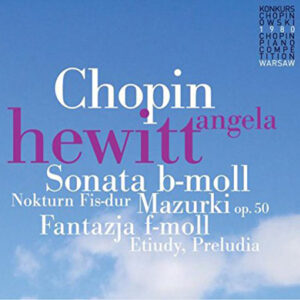One does not readily associate Angela Hewitt with Chopin’s music, aside from her Hyperion release containing the complete Nocturnes and Impromptus. However, she played a great deal of Chopin as a teenager, and in fact participated in the 1980 Warsaw International Chopin Competition, where the 22-year-old pianist made it through the third round before being eliminated. A selection of Hewitt’s performances from the first three rounds are published here for the first time.
Despite the strident archival engineering and occasional blemishes in the heat of battle, the polished pianism and intelligent musicianship we know from the latter-day Hewitt already was in place. The F-sharp major Nocturne Op. 15 No. 2 emerges with dramatic contrasts that differ from the pianist’s more mature, even-tempered studio recording, while the Black Key Etude is dapper and poised. The C major Op. 10 No. 7 Etude and a group of four Preludes feature sundry accentuations and caesuras that will strike listeners either as expressive or mannered. But Hewitt’s volatile dynamic surges and unbridled drive throughout the F-sharp minor Polonaise prove genuinely exciting (those upward scales in the transition between the central Mazurka section and the main theme’s recapitulation).
The Op. 25 No. 4 Etude features Hewitt’s pinpointed “stride” piano left-hand accompaniment against her beautifully controlled right-hand legato, while the pianist’s early experience studying dance arguably manifests itself in her treatment of the Op. 50 Mazurkas. In the B-flat minor sonata Hewitt finds her focus and musical center once she reaches the final two movements. The F minor Fantasy displays far more rhythmic discipline and architectural momentum than we hear from more than a few recent Warsaw victors, although again, the constricted sonics give little clue as to how Hewitt’s loudest passagework projected over the footlights during those tension-filled days. It’s also interesting that the young Hewitt largely eschews bringing out inner voices and counterpoints, given the painstaking linear orientation of her mature pianism. I’m not sure how Hewitt feels about her distant past coming back to haunt her, but these fascinating recordings do prove that she was much more than your typical competition pianist.
































